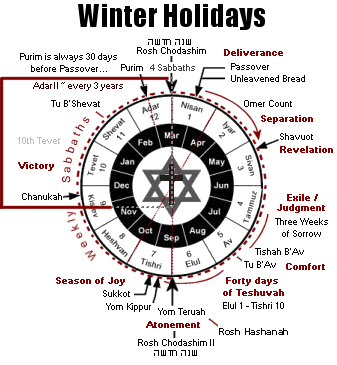|
Rosh Chodesh Tevet marks the 10th month of the Jewish calendar (counting from the first month of Nisan). This was the fateful month that Nebuchadnezzar king of Babylon besieged Jerusalem before the Temple was destroyed in 586 BC (2 Kings 25:1; Jer. 39:1; Ezek. 24:1-2). The name of the tenth month is explicitly called Tevet (ūśųĄūæųĄū¬) in the Scriptures (see Esther 2:16). Rosh Chodesh Tevet is sometimes observed as one day and sometimes as two, because the preceding month (Kislev) is sometimes "full" (consisting of 30 days) and sometimes deficient (consisting of only 29 days). With a two-day Rosh Chodesh, the first day is the 30th day of the preceding month (i.e., Kislev 30th), and its second day is the first day of the following month.
The Septuagint Translation
The 8th of Tevet is traditionally recognized as the date when the oldest translation of the Torah, the ancient Greek Targum (translation) called the "Septuagint" (or LXX, or "translation of the Seventy"), was finished. According to the early sages, "King Ptolemy II [3rd century BC] once gathered 72 elders, placed them in 72 separate chambers, without revealing to them why they were summoned. He entered each one's room and said: 'Write for me the Torah of Moses, your teacher, into Greek.' God put it in the heart of each one to translate identically as all the others did" (Tractate Megillah 9). Note, however, that the circumstances and motives surrounding this translation were suspect from the beginning. After all, what would motivate a Greek king of Egypt to test Jewish scholars in this way? And while Jewish tradition concedes that it was miraculous that the sages all translated the Torah using the same Greek constructions, they generally decry the "freezing" of the text into a particular interpretation, since the Torah is considered essentially untranslatable (i.e., there are many layers of meaning that are only revealed through the original Hebrew texts).
Critical scholarship shows that there are textual variants between the Koine Greek text of the Septuagint and the Masoretic text (i.e., the received text of modern Judaism). The Dead Sea Scrolls tend to confirm the Hebrew that underlies the Greek text over the present Masoretic text, though it must be stressed that the majority of these variations are quite minor (e.g. grammatical changes, spelling differences). After the 2nd century AD, however, most of the Jewish world regarded the Septuagint as an untrustworthy translation and associated it with Hellenistic influences and corruption. Unfortunately, the Christian world endorsed the Septuagint as "authoritative" and perpetuated its literal use instead of studying the Hebrew text and Jewish methods of exegesis. We wonder if much of the heresy of "replacement theology" does not trace back to this decision of the early church's leaders to abandon the Hebrew text for the Greek...

The 8th of Tevet is sometimes regarded as a fast day because the Greek Septuagint is considered a work of assimilation that abandoned Jewish identity and culture for the cause of Hellenism.
The Fast of Tevet
Asarah B'Tevet (the Tenth of Tevet) is a sunrise-to-sunset fast day that recalls the beginning of the siege of Jerusalem by Nebuchadnezzar, the King of Babylon (in 587 BC) and the beginning of the battle that ultimately would destroy the Temple and send the Jews into the 70-year Babylonian Exile. In modern Israel, Asarah B'Tevet also marks the day Kaddish is recited for people whose date or place of death is unknown. This has resulted in a day of mourning for the many Jews who perished during the Holocaust. Synagogue services normally include prayers of repentance (selichot) and the Torah portion recalls the story of the idolatry of the golden calf (Exod. 32:11-34:10).
Asarah B'Tevet and the Birth of Messiah
Messianic Jewish scholar Alfred Edersheim wrote that an early Aramaic source document called "The Scroll of Fasts" (i.e., Megillat Ta'anit: ū×ų░ūÆų┤ūÖū£ųĘū¬ ū¬ųĘūóų▓ūĀų┤ūÖū¬), which included addtional commentary in medieval Hebrew (called scholium), may refer to the 9th of Tevet as the day of Yeshua's birth (i.e., sometime during late December in our Gregorian calendars). Note that Jewish history regards the month of Tevet to be one of national tragedy, marking the beginning of the destruction of the Holy Temple by Nebuchadnezzar, King of Babylon (in 587 BC). After the destruction of the Second Temple in 70 AD, the early sages might have associated the birth of Yeshua as yet another reason for mourning the loss of the Temple on this date. (For more about the controversial date of the birth of Yeshua, see the article, "Christmas: Was Jesus really born on December 25th?")
|





